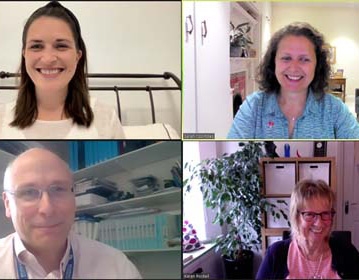Medics 4 Rare Diseases (M4RD) has produced a podcast about SCAD to mark World Heart Day (29 September).
Lucy McKay, CEO of M4RD, was joined by Beat SCAD Trustees Sarah Coombes and Karen Rockell, and Dr David Adlam, lead UK SCAD researcher.
The podcast challenges medics to ‘dare to think rare’ and offers tips and solutions for diagnosing and managing SCAD. Dr Adlam commented: ‘As with all rare diseases, if you don’t think about it, if you don’t look for it and test for it, you won’t make the diagnosis for it. And with SCAD, missing or delaying that diagnosis can be serious.’
He added: ‘It’s critical that as healthcare professionals we listen to what patients are telling us, get them to a place of safety, carry out simple tests (ECG and troponin) and, once diagnosed, provide the care they need.’
Managing SCAD doesn’t involve expensive tests and procedures, but it DOES require medics to spend a bit of time learning about the condition. Dr Adlam said it’s also important for medics to take a history – not just of physical health but emotional stressors too: death, divorce, work stress, moving house (or a combination of these) – are extremely common themes for SCAD patients.
Challenges getting a diagnosis
The podcast highlights the challenges SCAD patients face accessing medical care, getting a diagnosis and receiving appropriate aftercare.
The panellists discussed the fact that there is no such thing as a typical SCAD heart attack or SCAD patient. Some have sudden heart attack symptoms, such as severe chest pain, others have staggered onset heart attacks over the course of several days. Some will have pain referred to jaw, teeth, shoulder-blade, back – sometimes without chest or arm pain at all.
The experience of many SCAD patients is that 111 call takers, paramedics and A&E triage staff may make assumptions or exhibit bias when assessing people with cardiac symptoms who have few/no cardiac risk factors and no family history of cardiac ill health.
Current cardiac guidelines mean that if a patient’s ECG is normal, non-cardiac reasons for cardiac symptoms are often explored, with patients being told that they are having a panic attack or indigestion, for example.
And once a troponin blood test is done, and a heart attack is diagnosed, a patient without cardiac risk factors will often be asked when they last took cocaine…
Aftercare
In terms of further tests, once diagnosed, SCAD patients need scanning to check for other associated conditions, most commonly FMD (Fibromuscular Dysplasia).
And because 90% of SCAD patients are women and we still don’t understand the connection between female sex hormones and SCAD, many female SCAD patients will need to discuss contraception, pregnancy, menopause, HRT with someone who can relate it to their SCAD diagnosis. Most cardiologists are not comfortable doing this.
Clinical dilemmas
The podcast also delves into the challenges faced by doctors such as Dr Adlam, trying to provide a national service without any real budget to do so, and the dilemma presented by the current NHS commissioning system. Dr Adlam gets calls from colleagues across the UK faced with challenging decision-making scenarios and does his best to support them. But he has no specific funding for this service.
Dr Adlam shared his hopes for a future where every UK region is supported by a cardiologist knowledgeable about SCAD from a regional centre equipped to provide acute diagnoses, and then holistic short- medium- and long-term care for SCAD patients.
He said: ‘To make a massive difference to this population of SCAD patients, which is not a trivial population, would require – in NHS terms – a tiny investment. I’m sure that applies to many other rare diseases too. Even if you were to impact on 100 rare diseases, setting up each clinic would require very little compared to just a few nights’ occupancy of an ICU bed. What we do to support SCAD patients as outpatients is low cost but has a very high impact on our patient population.’
Research breakthroughs
Dr Adlam highlighted some of the research findings, including the fact that some genetic causes of SCAD do exist. Most underlying genetic issues are in common gene variants. He explained that it’s more about the pack of cards you are dealt when you are born, than having one gene that will cause a problem.
Interestingly, he said, if you have the common gene variants, [https://www.youtube.com/watch?v=cOtOpjnIZ-M] while making you more vulnerable to SCAD, you are slightly protected from traditional coronary artery disease. So, one set of genes that protect you from one thing mean that you are slightly more vulnerable to something else.
A few rare genes are also associated with SCAD, and with other known rare diseases: Polycystic Kidney Disease, Loeys-Dietz, Vascular Ehlers Danlos – affecting just 3-4% of SCAD patients.
It is hoped that studying male SCADs (a rare group within a rare condition) may provide some answers as to why SCAD occurs.
Key messages
The podcast is an informal mix of discussion, lived experience and medical expertise. Seven SCAD patients, Joannie, Erica, Terri, Charlotte, Amy, Karen and Sarah provided testimonies. A huge thank you to them all for making such powerful statements.
The podcast is a ‘must listen’ for healthcare professionals, as well as SCAD patients. In summary, key messages include:
- Allow your patient to be heard as a whole human being with a life behind them.
- Learning about rare conditions doesn’t only help doctors treat patients with rare conditions but adds to our greater knowledge.
- Partnership between clinical expertise and research, patients and patient organisations are crucial.
Click here to listen to the podcast. This year’s theme for World Heart Day is ‘Use Heart to Connect’ so please do share it widely to help us raise awareness of SCAD.

